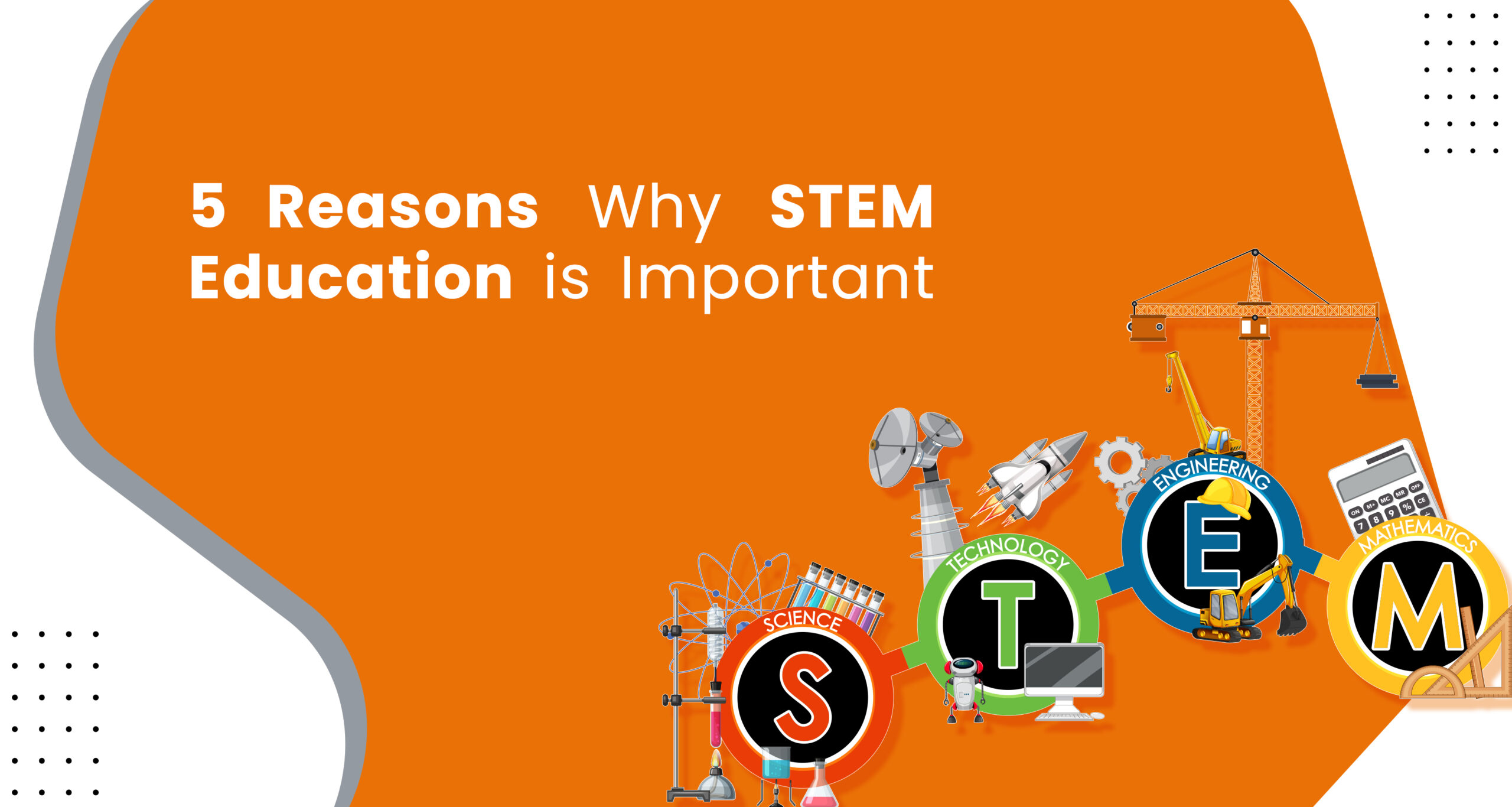
5 Reasons Why STEM Education is Important
Table of Contents:
- Introduction
- What is STEM Education?
- Benefits of STEM Education
- STEM Programs in School
- Conclusion
Introduction:
In today’s rapidly evolving world, STEM (Science, Technology, Engineering, and Mathematics) education has emerged as a cornerstone of our society. Its significance goes beyond classrooms and textbooks, as it plays a pivotal role in shaping our future. In this blog post, we will explore five compelling reasons why STEM education is crucial and provide answers to six frequently asked questions regarding STEM education.
What is STEM Learning?
STEM education being an interdisciplinary approach to learning focuses on four core academic disciplines: Science, Technology, Engineering, and Mathematics. It places a great deal of emphasis on combining different subjects to encourage critical thinking, problem-solving, and the application of information in real-world situations. Giving pupils the knowledge and skills they need to thrive in a society where technology is becoming more and more important is the aim of STEM education.
It encourages inquiry-based, hands-on learning that frequently involves projects, experiments, and group activities to stimulate imagination and creativity. In addition to training the next generation of scientists and engineers, STEM education aims to cultivate a wider range of 21st-century competencies, such as digital literacy, adaptability, and a thorough comprehension of the complex problems facing the global community.
Benefits of STEM Education
Education in the fields of STEM (science, technology, engineering, and mathematics) has several advantages that go well beyond the classroom. It gives pupils vital abilities that are necessary in today’s world, such creativity, critical thinking, and problem-solving. By fostering a thorough awareness of the technical and scientific processes that influence our daily lives, STEM education equips people to make wise decisions.
Additionally, it equips students for the dynamic labor market, since STEM-related fields continue to grow rapidly and present attractive career prospects.In addition to fostering an innovative and inquisitive mindset, STEM education tackles pressing issues such as medical advancements and climate change by emphasizing experiential learning and experimentation. This makes STEM education a vital force behind progress in society.
Importance of STEM Programs in School
Driving Technological Advancements
STEM education is at the heart of technological progress. It equips students with the knowledge and skills necessary to develop innovative solutions to complex problems. From breakthroughs in medical science to the latest advancements in artificial intelligence, STEM professionals are the driving force behind these developments. Without STEM education, our society would be unable to harness the full potential of technological advancements.
Fostering Critical Thinking and Problem-Solving Skills
STEM subjects encourage critical thinking and problem-solving skills from an early age. Students learn to approach challenges analytically, break them down into manageable components, and devise effective solutions. These skills are not only valuable in STEM careers but also in everyday life, enabling individuals to make informed decisions and address a wide range of issues.
Meeting the Demands of the Job Market
The job market is constantly evolving, with a growing demand for STEM professionals. Industries such as information technology, engineering, healthcare, and renewable energy are continuously seeking highly skilled workers. STEM education prepares individuals to excel in these fields, providing them with a competitive advantage in a dynamic job market.
Addressing Global Challenges
STEM education plays a pivotal role in addressing pressing global challenges, including climate change, healthcare disparities, and food security. By educating students about the scientific principles behind these issues and empowering them with the skills to innovate, STEM education cultivates the next generation of problem solvers who can help address these problems with long-term solutions.
Enhancing Economic Competitiveness
A strong STEM workforce enhances a nation’s economic competitiveness on a global scale. Countries with well-developed STEM education systems tend to be leaders in technological innovation and economic growth. By investing in STEM education, nations can position themselves at the forefront of the global economy, creating jobs and driving prosperity.
Conclusion
In conclusion, STEM education is not just about preparing students for careers in science and technology; it is about equipping them with essential skills and knowledge to thrive in a rapidly changing world. It drives technological advancements, fosters critical thinking, meets the demands of the job market, addresses global challenges, and enhances economic competitiveness. By understanding the importance of STEM education and addressing common questions, we can better appreciate its role in shaping our future and empowering individuals to make a positive impact on society.
Also Read: The Advantages of Studying Abroad: Unlocking New Horizons
FAQs
1. What is STEM education, and why is it important?
Ans- STEM education is an interdisciplinary approach to learning that focuses on science, technology, engineering, and mathematics. It is essential because it equips individuals with the knowledge and skills needed for careers in fields critical to technological advancements, problem-solving, and addressing global challenges.
2. How does STEM education benefit students in non-STEM fields?
Ans- STEM education fosters critical thinking, problem-solving, and analytical skills that are valuable in any career. These skills enable individuals to adapt to changing circumstances, make informed decisions, and excel in diverse fields, from business to the arts.
3. Is STEM education only for students who excel in math and science?
Ans- No, STEM education is for all students. While a strong aptitude for math and science can be advantageous, STEM programs are designed to support students of varying abilities and interests. Inclusive STEM education encourages diversity and ensures that everyone can benefit from its advantages.
4. How can we encourage more students to pursue STEM education?
Ans- To encourage more students to pursue STEM education, it is crucial to provide engaging and accessible STEM programs from an early age. Additionally, mentorship, exposure to STEM role models, and highlighting real-world applications of STEM concepts can inspire students to explore STEM careers.
5. What are the challenges in implementing effective STEM education programs?
Ans- Challenges in STEM education implementation can include inadequate resources, a shortage of qualified STEM teachers, and a lack of access to technology. Overcoming these challenges requires investment in education infrastructure, professional development for teachers, and equitable access to STEM resources.
6. How can parents support their children’s interest in STEM?
Ans- Parents can support their children’s interest in STEM by providing access to STEM-related books, toys, and activities. Encouraging curiosity, asking open-ended questions, and exploring STEM topics together can nurture a child’s passion for learning and problem-solving.
 AIR CONDITIONED
AIR CONDITIONED




